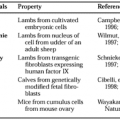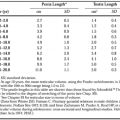PARATHYROID HORMONE
David Goltzman
Geoffrey N. Hendy
Parathyroid hormone (PTH) is essential for the physiologic maintenance of calcium homeostasis, and a marked excess or deficiency can cause severe and potentially fatal illness. Because of its essential role in metabolism, skeletal function, and renal function, considerable effort has been expended and substantial advances have been made in understanding the biosynthesis, molecular biology, secretion, metabolism, and action of this hormone. Improved quantitation methods have enhanced our appreciation of its complex physiology and pathophysiology. The molecular biology approach has contributed valuable information about the structure and synthesis of this molecule and has led to the identification and characterization of a parathyroid hormone–like molecule, parathyroid hormone–related protein (PTHrP); a receptor that mediates the actions of PTH and PTHrP, the PTH/PTHrP receptor; and a parathyroid calcium-sensing receptor.
This chapter examines the production, metabolism, function, and measurement of PTH as a foundation for understanding the cause, pathogenesis, and diagnosis of disorders of the parathyroid glands.







